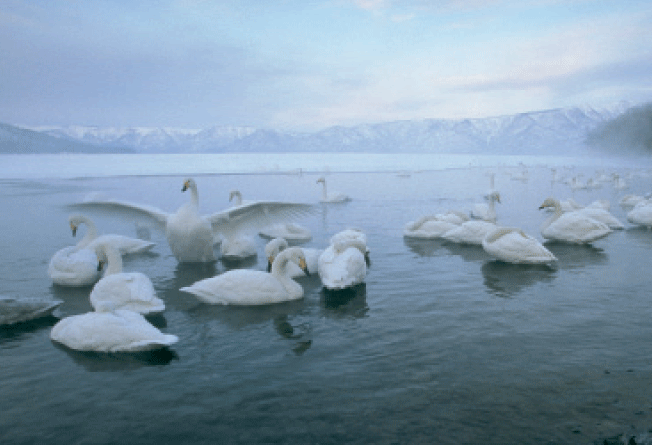
SWAN SERENADE
 |
From the swirl of its initial letter to its sighing vowel and feather-soft final consonant,
the very word – "swan" – suggests grace.
By: Cathy Newman
Photo: Tim Laman
Peter Ilich Tchaikovsky did not, after all, write "Duck Pond." The whooper swan, like its onomatopoeic cousins, the whistling and the trumpeter, belongs to an elegant society of sisters; the mute, Bewick's, black, and black-necked fill out the ranks.
First described by Carl Linnaeus in 1758, Cygnus cygnus can be considered a swan among swans, the type species, hence archetype, of all swans. It is also a swan of superlatives. With a population of about 180,000, the whooper, though vulnerable to loss of habitat, is among the most abundant of swans and trumps others in the sweep of its range.
To the ancients, the appearance of a swan, with its effortless glide on the mirror of a lake and lovely, unfurling flight, signaled evanescence and evoked immortal longings. Socrates, Plato tells us, heard the song of a swan on the day of his death. The Valkyries, in the guise of swans, bore their fallen heroes to the Valhalla of Norse mythology. Pythagoras believed the souls of poets passed into swans, a fitting entombment that turns the tattered phrase "poetry in motion" into a truly lyrical trope.
The swan, Russian poet Anna Akhmatova writes, "floats through the centuries" and into the turning wheel of seasons. Swans on their autumnal migratory flight – the celestial flutter of wings, the silver arrow of a flock splitting the sky – evoke poetic melancholy. Shadows lengthen. Days shorten. Another year closes in. Still, there is the reassuring uplift of fairy tales like Hans Christian Andersen's duckling turned swan, with its metamorphosis from plain to princely.
Bittersweet, these beautiful birds. Yet their loveliness masks the toll exacted by the gravitational pull of their large bodies and the strain of daily survival. Labored takeoffs, the frantic paddling of webbed feet and heavy beating of wings before their soaring ascent, a territorial aggressiveness directed at other swans and waterfowl that can turn vicious and, occasionally, deadly, suggest that beauty does not come as easily or kindly as we might wish.
(Stefano Unterthiner's book about whooper swans, "The Angels of Winter," was published in Italy this year .